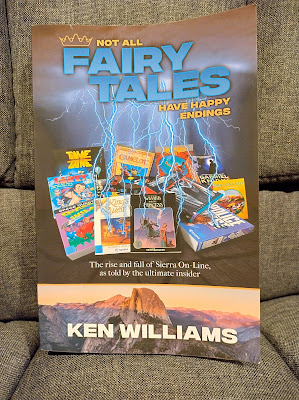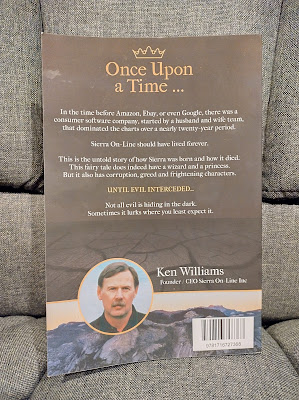 |
| Very dramatic title and artwork! |
| Quick Info | |
|---|---|
| Reviewed by: | Mark Goninon |
| Title: | Not All Fairy Tales Have Happy Endings: The Rise and Fall of Sierra On-Line |
| Author: | Ken Williams |
| Publisher: | Lulu Press |
| Number of pages (paperback): | 410 pages |
| Publication Date: | 24 July 2020 |
I've played a lot of games by Sierra
It looks like the era of COVID-19 has been a time for reflection especially among some of the great pioneers in PC gaming. Sid Meier released a memoir in 2020 and so did Ken Williams, co-founder of Sierra On-Line (or at least a book about his time there). His contribution to gaming history literature is called "Not All Fairy Tales Have Happy Endings" and he is referring to the untimely demise of Sierra On-Line, especially the studio that made the company famous based in Oakhurst, California: the studio responsible for just about all their "Quest" games.
Many of the games in my youth were either developed by Sierra or published by them. In fact, over the course of many years, I've actually played over 50 games by either Sierra On-Line, Sierra Entertainment or even its latest incarnation under Activision (which sadly only lasted a very short time a few years back). From primitive graphic adventures back in its heyday such as 1987's Space Quest II, to 3D point 'n' click adventures such as 1998's Quest for Glory V to the era where they only published games such as 2005's SWAT 4, I played my fair share of Sierra titles. I was fascinated by its history and the many talented people that worked there so it's no surprise I backed a Kickstarter project to aid in the publishing of a book called "The Sierra Adventure" by Shawn Mills. The book was an entertaining read and Shawn interviewed many of Sierra's alumni but what did the co-founder of Sierra, Ken Williams think? What was his personal opinion on how things went down? This is why I had to get "Not All Fairy Tales Have Happy Endings": I just needed to learn more about one of the greatest PC game companies of yesteryear and what better way to do it than read a book from someone who was there from the very start?
Anyway, I let my family know that I was on the lookout for this book and my generous brother and sister-in-law gifted me a copy for Christmas in 2020 (so, thanks again, guys)!
 |
| Ken wasn't kidding about his aversion to smiling! |
It's all about the money
The book is 410 pages long and split up into a prologue and 43 chapters that covers Ken's youth in the 1960s and 1970s, Sierra On-Line's heyday in the 80s and 90s, and its eventual demise starting with the closure of the original Sierra office in Oakhurst in 1999. The early chapters of the book goes into some depth on how he and Roberta started off making a living from developing and selling computer games, and how Sierra grew into the developer of graphic adventures that many people fondly remember. Later chapters however delve more into the business side of things probably because they mirror the way Ken's career headed as he became less of a developer and more a CEO of a large software development and publishing company that owned many subsidiaries. Ken also makes reference to the many celebrities he's met in his life including Steve Jobs, Steve Wozniak, Jeff Bezos and Bill Gates. He also discusses about some of his regrets, such as failing to continue a publishing deal with Richard Garriott's or the fact he didn't push harder to acquire id Software back in its early days.
Reading this book shortly after reading Sid Meier's Memoir, meant it was natural I was going to start comparing the two. Despite both of these men being giants of the PC gaming industry through the 80s and 90s, they seemed to have very different motivations and it shows in what they have chosen to write about. Sid Meier is very much a game designer and remains one to this very day. His book discusses concepts of game design and where he found inspiration for his games. He discusses the business side of things only to provide background and context: he lives for creating games.
In contrast, Ken Williams, while a brilliant engineer in his youth, developing the first graphic adventure game in the world, wasn't really a game designer: that was his wife, Roberta. Ken is more of a salesman (and he says as much in his book). To him, making games was a means to an end, a way of making lots of money with a new, exciting product. While this book does cover some of Sierra On-Line's history, it's often viewed through the lens of how it pioneered technologies or the process Ken followed in order to grow the company and make money. The reader will find lots of project management tips, marketing strategies and even hiring policies. In fact, Ken dedicates a chapter explaining how you only want to hire developers that without hesitation work on weekends and if you're a family oriented employee, forget it, you don't stand a chance. He swears by this as being the only way a company will succeed which seems dismissive of the current attitude towards game studios that coerce their employees into accepting "project crunch".
But then again, Ken doesn't strike me as the sort of guy to care much about political correctness or what others think (unless they happen to be self-made billionaires themselves). Whatever makes the most money is the best course of action. At least that's the most important lesson I get from reading this book.
|
7
|
"Not All Fairy Tales Have Happy Endings" delivers in providing an account of what happened at Sierra On-Line according to one of its co-founders, Ken Williams. He provides a candid account of what he believes made the company the success that it was and it's mainly due to perseverance, keen business acumen, clever marketing, innovation and sound project management. Rarely is game design mentioned in the book at least when compared to other books of the past couple of years such as Shawn Mills's "The Sierra Adventure" (which delves more into the game design along with interviews from those who worked on the games) or even "Sid Meier's Memoir!" It's still an interesting and worthwhile read, and a must-buy for Sierra fans. |
If you like this book, you might like…
Comments
Post a Comment